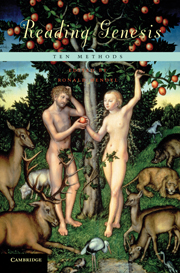Book contents
- Frontmatter
- Contents
- Contributors
- Acknowledgments
- Reading Genesis
- Introduction
- 1 Literature
- 2 Cultural Memory
- 3 Sources and Redaction
- 4 Gender and Sexuality
- 5 Inner-Biblical Interpretation
- 6 Rabbinic Interpretation
- 7 Interpretation in the Early Church
- 8 Translation
- 9 Modern Literature
- 10 Modern Theology
- Index of Biblical Citations
- General Index
- References
Introduction
Published online by Cambridge University Press: 05 June 2012
- Frontmatter
- Contents
- Contributors
- Acknowledgments
- Reading Genesis
- Introduction
- 1 Literature
- 2 Cultural Memory
- 3 Sources and Redaction
- 4 Gender and Sexuality
- 5 Inner-Biblical Interpretation
- 6 Rabbinic Interpretation
- 7 Interpretation in the Early Church
- 8 Translation
- 9 Modern Literature
- 10 Modern Theology
- Index of Biblical Citations
- General Index
- References
Summary
This book attempts to do something new and old in biblical interpretation. The new involves three moves: (1) charting methods of reading Genesis that have become vital in recent years, including literary criticism, cultural memory, the history of sexuality, and inner-biblical interpretation; (2) renewing the practice of several older methods that retain their vitality, including source criticism and theology; and (3) expanding the horizons of the study of Genesis to encompass the reception and transformation of Genesis in Western culture, including rabbinic and patristic interpretation, translation, and modern literature. The family of methods presented in this book focuses on ways of reading Genesis and on ways of reading influential past readings of Genesis. To put it differently, we are engaged in studying a text and its effects in Western culture. This combination of perspectives is relatively new in biblical studies and represents a proposal about how Genesis can be read (and reread) in the university and the modern world.
At the same time, this book is a throwback to an older era – let us call it a pre-postmodern era – when texts were believed to have meanings and when it was the task of the interpreter to discuss those meanings with intelligence and insight. Each contributor to this volume practices what Nietzsche called “the incomparable art of reading well,” which involves a commitment to the notion that texts and their interpretations are worth grappling with in our work and lives. This theoretical empiricism, which can have many flavors and intensities, necessarily includes an appreciation of the interdependence of various approaches to the text – including the historical, literary, philosophical, anthropological, and theological. It involves a pragmatic openness to multiple converging and diverging paths of study for the simple reason that, as Wittgenstein says, “[I]t is possible to be interested in a phenomenon in a variety of ways.” There is no single authoritative – or authoritarian – method of reading Genesis.
- Type
- Chapter
- Information
- Reading GenesisTen Methods, pp. 1 - 12Publisher: Cambridge University PressPrint publication year: 2010



